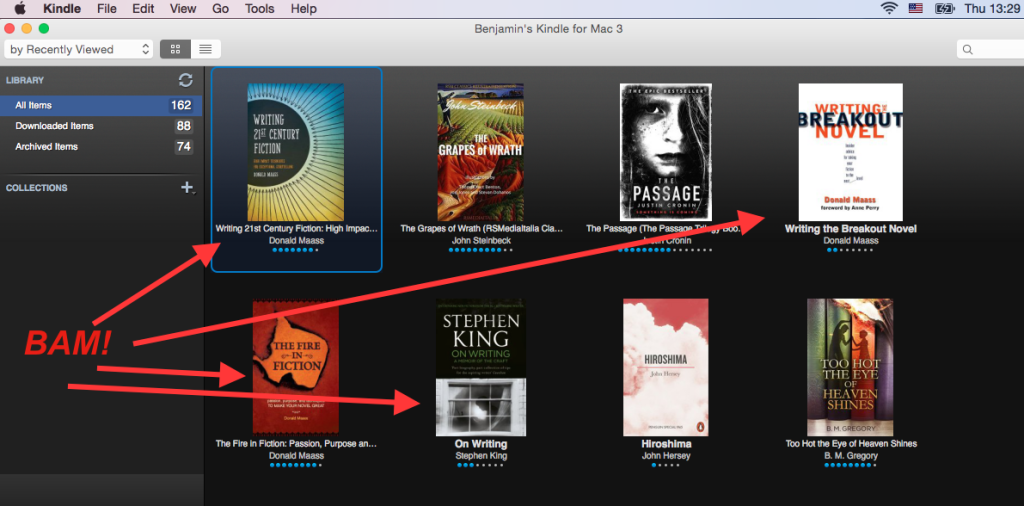“Too many manuscripts tell their stories with timidity. What’s needed instead are explosive bursts of divinity: explosions of insight, booms of self-revelation, scenes that flare open in the dark, prose that sizzles like sparklers.” Donald Maass on setting off fireworks in your writing Writing 21st Century Fiction
I read this after months of tearing my hair out.
Writing had stopped being fun.
It was just an obligation.
And I hated it.
But reading Maass’s call for writers to start setting off fireworks in their fiction spoke to me right when I needed it.
I realised something simple but important…
Something many writers forget along the way:
If I’m not having fun, neither is the reader.
That realisation was enough to revamp my writing and bring my passion back with full force.
Writing is playing, daring, dreaming.
It’s not supposed to be a chore.
Sure, sometimes it feels like work but you’re supposed to be getting a kick out of it too.
When I started approaching my writing like it was a fun game, my mindset shifted and my productivity shot up.
I started doing crazy stuff like……
- Asking my girlfriend for a really weird word or phrase and then challenging myself to insert it into my manuscript (such a fun game).
- Writing something that I believe to be true yet offensive.
- Taking a thought I’ve had about my daily life and seeing how certain characters might present that thought (would they even have that thought?)
- Hiding references to other works in plain sight. Kind of like how Red Apple Cigarettes always appear in Tarantino films.
- Restricting “convenient” yet dull emotions and sticking only to the subtle ones.
- Giving the reader information without explicitly giving it. Can I make them work for it?
That’s the one of the best pieces of writing advice I have ever received.
If you want to get schooled in the art of writing, I consider these three Maass books to be an integral part of any budding writer’s self-assigned curriculum:
Don’t just read them. Take notes, follow the practice activities, apply what you’ve learned to your writing.
You will learn more about the craft of writing from those three books than you would from a whole year of creative writing classes. You’ll feel more invigorated too.
On the subject of launching literary fireworks, Maass also says this:
There’s hidden gunpowder in every dialogue exchange, every event, every exit. Your main characters can douse themselves in gasoline. Secondary characters can throw molotov cocktails. You are a god hurling thunderbolts. Or you can be. All it takes is taking delight in shaking things up.
More of the best writing advice
Write shitty first drafts. Anne Lamott Bird by Bird
Lamott’s advice is perfect for any writer who suffers from constant self-editing. Writer’s block is caused by fear. Fear that our writing isn’t good enough.
But the first draft is just about getting the story down as fast as possible.
No looking back.
Accepting the fact that we all write first drafts that stink.
The magic happens later. In the second, third, fourth, tenth drafts.
Just like a Michelangelo started with a hunk of stone, then carved that bad boy into a stone cold hunk, we writers need to chisel away and understand that each new permutation improves our work.
The road to hell is paved with adverbs. Stephen King On Writing
Is there any serious writer who hasn’t read Stephen King’s ‘On Writing’ yet?
If you’re sheepishly raising your hand right now and looking around the class for solidarity, I HIGHLY recommend you grab a copy.
‘On Writing’ is probably the most perfect memoir on the craft of writing ever written. It is stuffed with gems and should be a staple on the bedside table of any budding writer for a long time.
Elaborating further on the subject of adverbs, Stephen King says this:
To put it another way, they’re like dandelions. If you have one on your lawn, it looks pretty and unique. If you fail to root it out, however, you find five the next day… fifty the day after that… and then, my brothers and sisters, your lawn is totally, completely, and profligately covered with dandelions. By then you see them for the weeds they really are, but by then it’s – GASP!! – too late.
King’s biggest beef with these linguistic dandelions comes in the form of dialogue attribution.
He gives these nasty examples:
‘Put it down!’ she shouted menacingly.
‘Give it back,’ he pleaded abjectly, ‘it’s mine.’
‘Don’t be such a fool, Jekyll,’ Utterson said contemptuously.
I’m sure you’ve read tons of books that sound like this.
I’m also sure you’ve written tons of sentences that sound like this.
I certainly did.
I remember going over the first draft of one of my books (shortly after a refresher lesson from Mr. King) and thinking ho-lee-shiiiiit.
Those damn weeds were everywhere.
So I spent a week combing through my manuscript and yanking them out.
It was painful but the result was a much better piece of work.
Write one true sentence. Ernest Hemingway Ernest Hemingway On Writing
This is the best writing kick-start I’ve ever heard.
Just write one true sentence. One thing you know to be true. Then go on from there.
It doesn’t matter what you’re writing. Fiction, non-fiction, kids stories, erotica, wedding poems. Whatever it is, just write one true sentence and you’ll get into the groove.
It might take you an hour just to think of that one true sentence. But one you’ve got it, you’re cooking.
The Writer’s Reading Curriculum
If I were leading a course on how to write (God forbid I ever go back to teaching), this would be the first week’s curriculum:
- The Fire in the Fiction
- Writing the Breakout Novel
- Writing 21st Century Fiction
- Bird by Bird
- On Writing
- Ernest Hemingway On Writing
I would then tell you to get out of my class (teacher’s hungover again), read those books, mine them for gems, and immediately apply what you’ve learned.


